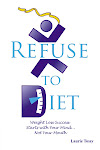Lots of so-called "experts" will tell anyone who is trying to lose weight that it is simply a matter of consuming fewer calories than you expend. These "experts" make it sound like weight loss is a math equation.
Having dieted most of my life and calculated calories, fat grams, carbs and just about anything else one can calculate, I can tell you that weight loss success is definitely NOT a simple math equation.
The math equation myth prevails despite evidence by millions of people like me. We are accused of
cheating. We are accused of being
lazy. We are told we just aren't counting everything that we are eating. We are accused of
lying.
The math equation myth goes hand in hand with the diet myth. Neither is right, it isn't simply math and diets don't work either. Neither take into account human beings and our infinite variety.
In my book,
Refuse to Diet: Weight Loss Success Starts with Your Mind...Not Your Mouth I explain more about some of the diet myths and why they are fact, not fiction...but still countless people just don't believe that there is any other explanation, they WANT to believe that is just math.
Except for those of us caught up in the math equation nightmare, of course.
What I find ironic is that many of the "experts" who claim you just have to expend more calories (work out more) or consume fewer calories (eat less, or eat lower calorie foods) will be the very same people who will then say on national television that we hold onto weight when we are stressed!
Hello??? Which is it, folks? Don't try to tell me that it is math and then excuse 1 person because of stress. Math is math. Math is not biased. Math doesn't give a *&#$ about your stress level. This is why mathematicians love math. This is why the rest of us do not.
Are there extenuating circumstances that can cause you to either gain weight or not lose weight despite your efforts to exercise and eat fewer calories? You betcha!
OK, there's the infamous aforementioned stress for one. Weather can actually also affect your weight loss. Whether or not you drink ample water will affect the number on the scale...and water has zero calories so that would not figure into any math equation. Some medical conditions and medications will affect your weight. Traveling, eating different foods, or eating more salt than normal...these can all affect your weight temporarily. And of course when you are building muscle while you lose fat (a good combination to go after) there will be times when your pounds will go up, even though your fat content will be dropping. Beyond all that, the source of calories is an important factor on whether or not you lose weight...and especially if you can keep it off.
These are just some of the weight loss challenges we face that dispute the math-equation theory.
I say none of this to discourage your from improving your health.
I say it to free you from the tyranny of the scale! There are no health benefits to staying obese. There are tons of health benefits for improving your health by improving your eating and moving your body more--even if you don't drop a single pound!
To lose weight successfully, permanently, you must work on your mindset. You must believe that it is possible and that you are worth it...and the number on the scale has no bearing on your value as a human being!
You must eat food that nourishes and fuels you body. The same number of calories consumed can have a different impact on your health and your weight depending on where those come from. You can eat zero fat and not lose weight...because your body needs some fat in order to lose fat. You can count calories every day but if the calories don't count you won't be healthy or have a sustained weight loss.
If you are struggling with losing weight I suggest you start with your mindset. Once you have that straight then weight loss happens naturally. If you find that you aren't dropping weight and you have made sure there is not a medical reason for it (for example, did you know that diabetes medication almost always makes a person GAIN weight?) and you truly have excess fat to drop, then
- Reduce your stress
- Reduce your salt intake
- Increase your pure water intake
- Be sure the calories you are eating are the right ones
and most important, put away the scale! Stop focusing on the number you don't want. Instead focus on the steps you are taking to improve your health...and they WILL follow!





